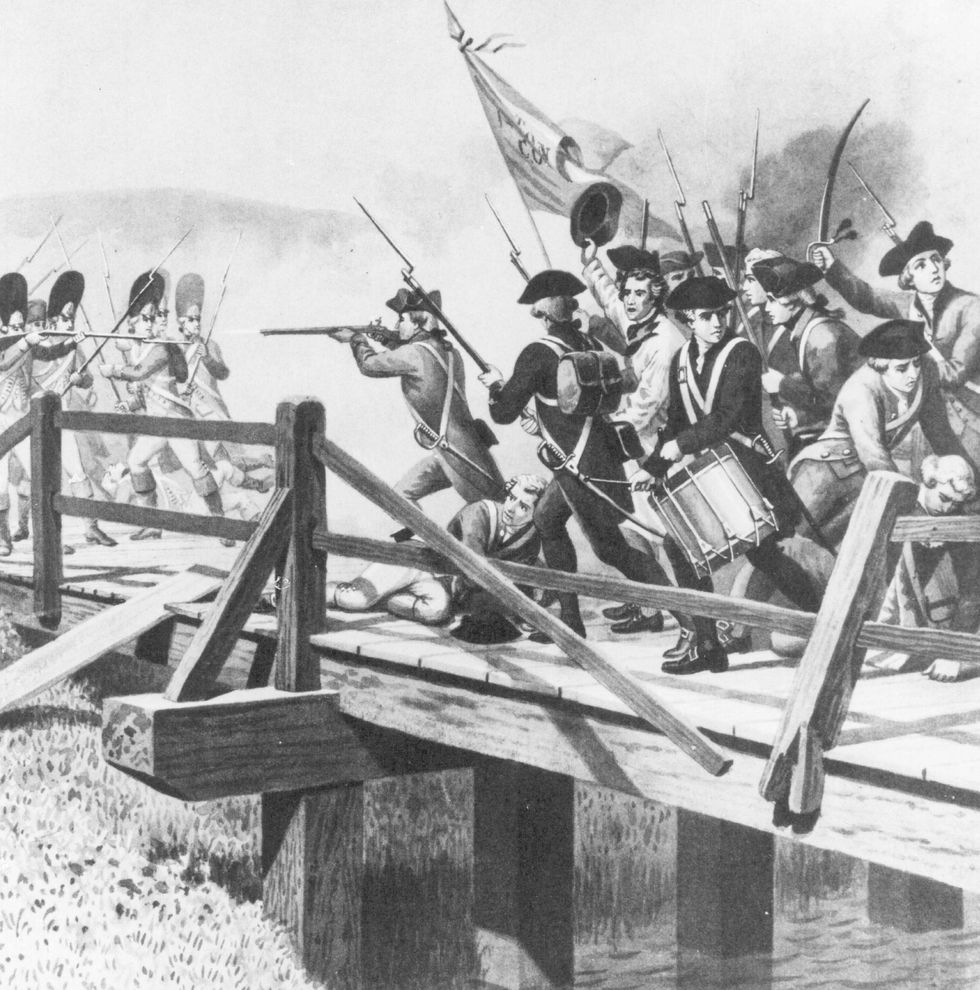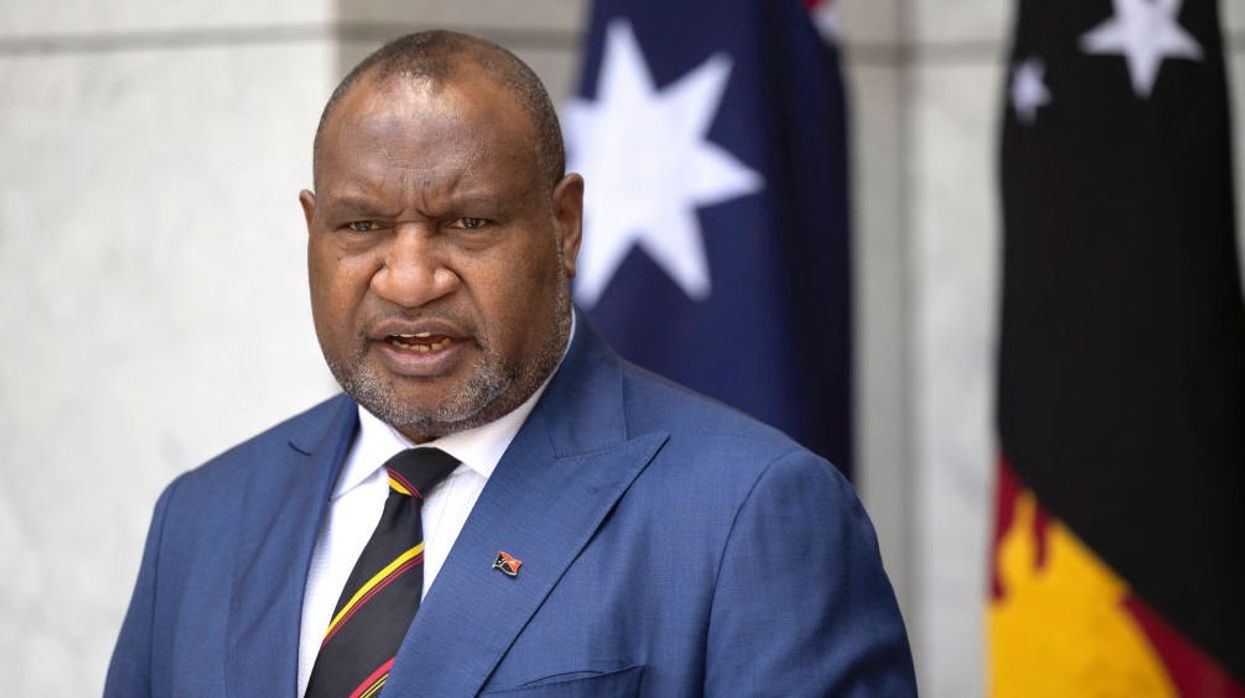BOSTON (APRIL 20, 1775) — American militiamen, after a brief retreat from a small skirmish in Lexington resulting in several dead, have pushed British redcoats out of Concord, giving colonists a victory in what may be the first of many military battles between Britain and defiant American colonists.
In a sequence of events that began late night on April 18, 1775, a plan by British Gen. Thomas Gage to capture American leaders and munitions was foiled when American volunteers were warned of an oncoming attack by British regulars in the town of Concord after British troops exchanged fire at Lexington, Massachusetts, with American patriots.
According to anonymous sources, Gage's plan was to furtively move British regulars to first capture Colonial leaders Samuel Adams and John Hancock in the town of Lexington, then advance to Concord where the British planned to seize American stockpiles of gunpowder. Thanks to the efficiency and skill of American intelligence, American forces were forewarned of Gage and his plan. British regulars were slowed by American "minutemen" — American militiamen ready to react at a moment's notice — at Lexington and along the route.
American silversmith and spy Paul Revere revealed that he had received word that British forces, led by British Maj. John Pitcairn, were to advance on Lexington to capture Adams and Hancock. Revere, 41, set up a warning system with North Church's Robert Newman that involved displaying one lantern from the church's steeple in the British were planning to advance from land, and two lanterns if by sea.
Sources say that Newman had displayed two around 10 p.m. on Tuesday, leading Revere and two other riders, tanner William Dawes, and Dr. Samuel Prescott to sprint across the countryside, warning colonists of the oncoming British forces from Boston.
Thanks to the early warning, Adams and Hancock were able to escape from Lexington. Their whereabouts are currently unknown.
Instead of marching into the town unimpeded, witnesses say that on early Wednesday morning, April 19, Pitcairn found himself and his 240 troops face to face with 80 American militiamen under the command of Capt. John Parker in the town of Lexington. Reports from eyewitnesses say that for some time, American and British troops faced each other at the ready, but did not fire.
Conflicting reports describe how the battle began, but according to both sides a shot was heard that started a brief skirmish between the minutemen.
"At 5 o’clock we arrived [in Lexington], and saw a number of people, I believe between 200 and 300, formed in a common in the middle of town; we still continued advancing, keeping prepared against an attack though without intending to attack them; but on our coming near them, they fired on us two shots, upon which our men without any orders, rushed upon them, fired and put them to flight; several of them were killed; we could not tell how many, because they were behind walls and into the woods," said British Lt. John Barker.
Militiaman Cpl. John Munroe remembers it differently, however.
"After the first fire of the regulars, I thought, and so stated to Ebenezer Munroe ... who stood next to me on the left, that they had fired nothing but powder; but on the second firing, Munroe stated they had fired something more than powder, for he had received a wound in his arm; and now, said he, to use his own words, 'I'll give them the guts of my gun.'," Munroe said. "We then both took aim at the main body of British troops the smoke preventing our seeing anything but the heads of some of their horses and discharged our pieces."
This is the first exchange of gunfire between American and British forces during the rising tensions between the mother country and the American colonists. According to reports, eight Lexington men were killed, and 10 were wounded. Only one British soldier was wounded.
After some difficulty, Pitcairn was able to reassemble his men and march on Concord. Reports say that the British entered the town with little difficulty and began searching for the hidden American munitions. Due to good intelligence and forewarning, however, the American militia were able to hide away a good deal of their munitions, meaning that the British were not unable to find much.
Meanwhile, Concord militiamen gathered just outside of Concord and their strength further increased as volunteers from the neighboring towns rallied around militiaman Col. John Barrett on Punkatasset Hill overlooking Concord.
Witnesses say that once Barrett's forces had reached sufficient strength — over 1,000 men according to reports — he led American militiamen into Concord over the North Bridge, overwhelming the redcoats and forcing their retreat from Concord, and back to Boston. American militiamen reportedly shadowed British troops during their retreat, killing some 125 redcoats, including officers. During the course of the retreat, American forces continued to swell as militia from neighboring towns continued to join the rebel ranks.
By the time the British retreat neared Charlestown, the American militia substantially outnumbered the British regulars and might have completely obliterated the British force. However, American Col. Timothy Pickering, who had assumed command of a large militia force from Salem and Marblehead, allowed the British to escape to defensible positions in Charlestown, where they were reinforced by Gen. Gage.
Col. Pickering alleges that he allowed the British to escape on the orders of Gen. William Heath, a charge that Gen. Heath denies. At present, Gen. Heath has been relieved by Gen. Artemas Ward, who has placed the British forces in Boston under an effective siege.
Militiamen say that while a battle was not intended in Lexington, their victory in Concord has them energized and ready to take on the British forces in the future.



